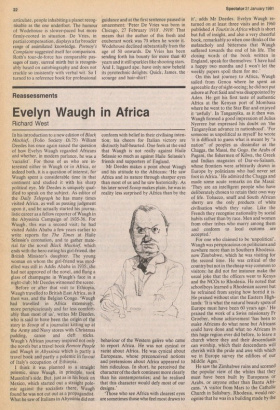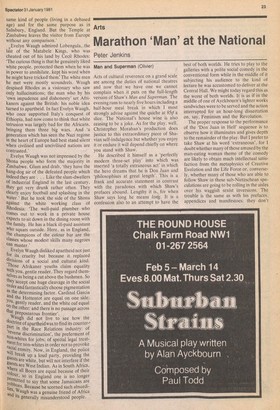Reassessments
Evelyn Waugh in Africa
Richard West
In his introduction to a new edition of Black Mischief, (Folio Society £6.75) William Deedes has once again raised the question of how Evelyn Waugh regarded Africans and whether, in modern parlance, he was a 'racialist'. For those of us who are interested either in Waugh as in Africa, or indeed both, it is a question of interest, for Waugh spent a considerable time in that continent and studied it with his sharp political eye. Mr Deedes is uniquely qualified to speak on the subject. As editor of the Daily Telegraph he has many times visited Africa, as well as passing judgment upon it, and he actually started his journalistic career as a fellow reporter of Waugh in the Abyssinia Campaign of 1935-36. For Waugh, this was a second visit; he had visited Addis Ababa a few years earlier to write reports for The Times at Haile Selassie's coronation, and to gather material for the novel Black Mischief, which ends with the hero eating his girl-friend, the British Minister's daughter. The young woman on whom the girl-friend was modelled was still in Addis Ababa in 1935; she had not approved of the novel, and flung a glass of champagne in Waugh's face in a night-club; Mr Deedes witnessed the scene.
Before or after that visit to Ethiopia, Waugh travelled to British East Africa, as it then was, and the Belgian Congo. 'Waugh had travelled in Africa extensively, more perspicaciously and far less comfortably than most of us', writes Mr Deedes, who is said to have been the origin of the story in Scoop of a journalist kitting up at the Army and Navy stores with Christmas pudding, canoe and cleft sticks. Waugh's African journey inspired not only. the novels but a travel book Remote People and Waugh in Abyssinia which is partly a travel book and partly a polemic in favour of Italy's occupation of Ethiopia.
I think it was planned as a straight polemic, since Waugh, in principle, took Mussolini's side. But, just as in his book on Mexico, which started out a straight polemic against the socialists there, Waugh found he was not cut out as a propagandist. What he saw of Italians in Abyssinia did not conform with belief in their civilising intention; his cheers for Italian victory are distinctly half-hearted. One feels at the end that Waugh is not really against Haile Selassie so much as against Haile Selassie's friends and supporters of England.
Mr Deedes makes a point about Waugh and his attitude to the Africans: 'He saw Africa and its nature through sharper eyes than most of us and he saw historically. As his later novel Scoop makes plain, he was in reality less surprised by Africa than by the behaviour of the Western galere who came to report Africa. He was not cynical or racist about Africa. He was cynical about Europeans, whose preconceived notions and pretensions about Africa appeared to him ridiculous. In short, he perceived the character of the dark continent more clearly than his contemporaries; and he realised that this character would defy most of our designs.'
'Those who see Africa with clearest eyes are sometimes those who feel most drawn to it', adds Mr Deedes. Evelyn Waugh returned on at least three visits and in 1960 published A Tourist in Africa which is short but full of insight, and also a very cheerful book, remarkably so when one thinks of the melancholy and bitterness that Waugh suffered towards the end of his life. The closing words of the book written in England, speak for themselves: 'I have had a happy two months and I won't let the weekly papers spoil them for me.'
On this last journey to Africa, Waugh sailed from Genoa where he spent an agreeable day of sight-seeing; he did not put ashore at Port Said and was disappointed by Aden. He got his first taste of authentic Africa at the Kenyan port of Mombasa where he went to the Star Bar and enjoyed it 'awfully'. In Tanganyika, as it then was. Waugh formed a good impression of Julius Nyerere but expressed his doubt on 'the Tanganyikan advance in nationhood'. 'For someone as unpolitical as myself' he wrote 'it is difficult to guess what is meant by "a nation" of peoples as dissimilar as the Chagga, the Masai, the Gogo, the Arabs of Pagani, the fishermen of Kilwa, the Greek and Indian magnates of Dar-es-Salaam, whose frontiers were arbitrarily drawn in Europe by politicians who had never set foot in Africa.' He admired the Chagga and made some acute remarks on the Masai: 'They are an intelligent people who have deliberately, chosen to retain their own way of life. Tobacco, snuff and South African sherry are the only products of white civilisation which they value, Like the French they recognise nationality by social habits rather than by race. Men and women from other tribes who marry among them and conform to local customs are accepted.'
For one who claimed to be 'unpolitical', Waugh was perspicacious on politicians and nowhere more than in Southern Rhodesia, now Zimbabwe, which he was visiting for the second time. He was critical of the countrybut not in the cheap way common to visitors; he did not for instance make the usual joke that the officers went to Kenya and the NCOs to Rhodesia. He noted that schoolboys learned a Rhodesian accent but he refrained from saying how horrid it is. He praised without stint the Eastern Highlands: 'It is what the natural beauty spots of Europe must have been 60 years ago.' He praised the work of a Swiss missionary Fr Graeber, whose achievement 'has been to make Africans do what none but Africans could have done and what no Africans in this huge region ever did before, to leave a church where they and their descendants can worship, which their descendants will cherish with the pride and awe with which we in Europe survey the edifices of our Middle Ages.' He saw the Zimbabwe ruins and scorned the popular view of the whites that they must have been built by Europeans or Arabs, or anyone other than Bantu Africans. 'A visitor from Mars to the Catholic Church in Salisbury, Rhodesia, would recognise that he was in a building made by the same kind of people (living in a debased age) and for the same purpose as in Salisbury, England. But the Temple at Zimbabwe leaves the visitor from Europe without any comparison.'
,Evelyn Waugh admired Lobengula, the last of the Matabele Kings, who was cheated out of his land by Cecil Rhodes: 'The curious thing is that he genuinely liked white people, protected them when he was in power to annihilate, kept his word when he might have tricked them: The white men he met were mostly scoundrels. Waugh despised Rhodes as a visionary who saw only hallucinations; the man who by his 'own impudence and dishonesty' set Afrikaners against the British: his noble idea turned to apartheid. In fact Evelyn Waugh, who once supported Italy's conquest of Ethiopia, had now come to think that white intrusion was largely bad for the Africans, bringing them three big wars. And 'a generation which has seen the Nazi regime in the heart of Europe had best stand silent when civilised and uncivilised nations are contrasted.'
Evelyn Waugh was not impressed by the Shona people who form the majority in Zimbabwe. Glum and drab, 'they have the hang-dog air of the defeated people which indeed they are . . . Like the slum-dwellers of industrial England in the last century, they get very drunk rather often. They clearly enjoy football and splashing in the water.' But he took the side of the Shona against the white working class of Rhodesia: 'The well-paid plumber who comes out to work in a private house expects to sit down in the dining room with the family. He has a black ill-paid assistant Who squats outside. Here, as in England, the champions of the colour bar are the classes whose modest skills many negroes Can master.'
Evelyn Waugh disliked apartheid not just for its cruelty but because it replaced divisions of a social and cultural kind. 'Those Afrikaner youths claim equality With you, gentle reader. They regard themselves as being a cut above the bushmen. So theY'accept one huge cleavage in the social order and fantastically choose pigmentation aS the determining factor. Cardinal Garcia and the Hottentot are equal on one side; Yell, gently reader, and the white oaf equal 911 the other: and there is no passage across that Preposterous frontier'. , Waugh did not live to see how the doctrine of apartheid was to find its counterpart in the Race Relations industry: of „reverse discrimination', the preferment of "en.whites for jobs; of special legal treatMent for non-whites in order not to provoke ra,cial enmity. Now, in England, the police will break up a loud party, providing the guests are white, but will not interfere if the tluiests are West Indian. As in South Africa, colliere all Boers are equal because of their SO in England one is no longer ,,voer,mitted to say that some Jamaicans are ';i„Dboes. Because he scorned such absurdia's, Waugh was a genuine friend of Africa Id its generally misunderstood people.







































 Previous page
Previous page